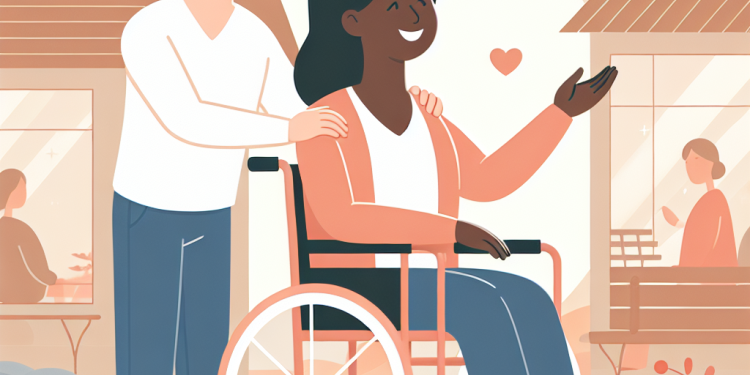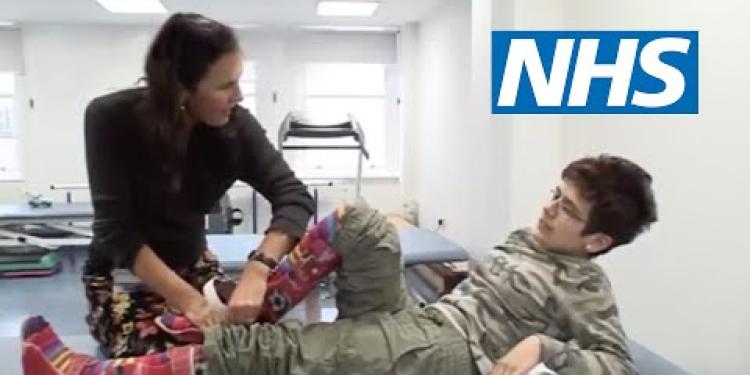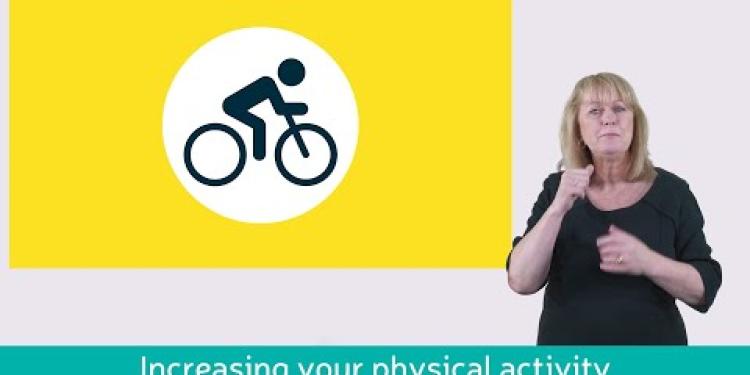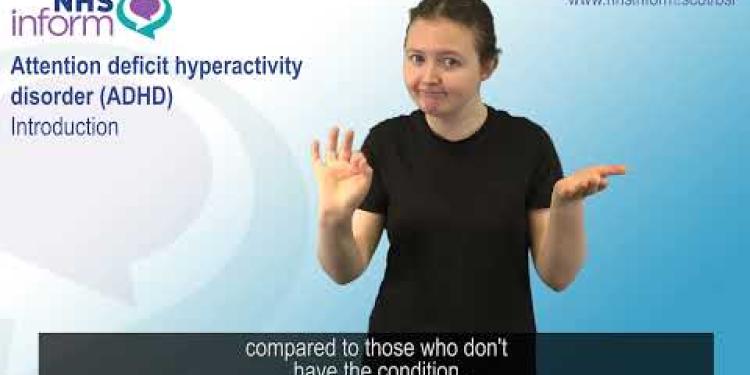Important Information On Using This Service
- Ergsy carefully checks the information in the videos we provide here.
- Videos shown by YouTube after a video has completed have NOT been reviewed by ERGSY.
- To view, click the arrow in the center of the video.
Using Subtitles and Closed Captions
- Most of the videos you find here will have subtitles and/or closed captions available.
- You may need to turn these on and choose your preferred language.
Turn Captions On or Off
- Go to the video you'd like to watch.
- If closed captions (CC) are available, settings will be visible on the bottom right of the video player.
- To turn on captions, click settings.
- To turn off captions, click settings again.
Find A Professional
More Items From Ergsy search
-

What is a learning disability?
Relevance: 100%
-

The NHS Long Term Plan for learning disability and autism
Relevance: 93%
-

Autism: Graeme's story | NHS
Relevance: 60%
-

Use of reasonable adjustments to reduce health inequalities for people with a learning disability
Relevance: 54%
-

Flu vaccinations for people with a learning disability
Relevance: 51%
-

Transforming Care for people with Learning Disabilities and/ or Autism: Peter's Story
Relevance: 50%
-

Accessing cervical screening with the right support for people with a learning disability
Relevance: 47%
-

NHS-led Provider Collaboratives: improving mental health, learning disability and autism services
Relevance: 47%
-

Autism - My Story - Rosalind | NHS
Relevance: 47%
-

Helping someone with multiple diabilities
Relevance: 45%
-

We are autistic | NHS
Relevance: 44%
-

Autism - My Story - Adrian | NHS
Relevance: 43%
-

Harshi’s learning disability annual health check and health action plan
Relevance: 33%
-

Autism Assessment - What Happens in Your Appointment
Relevance: 28%
-

Dyslexia, Dyspraxia & Overlapping Learning Difficulties
Relevance: 22%
-

What support is available for families of individuals with PIMD?
Relevance: 21%
-

Profound intellectual and multiple disabilities | NHS
Relevance: 17%
-

SLaM's Suicide Prevention, Learning and Support Strategy
Relevance: 17%
-

See4School
Relevance: 12%
-

Proposed Welfare Cuts and Their Impact on Vulnerable Populations
Relevance: 11%
-

Bowel Cancer
Relevance: 10%
-

Elbow
Relevance: 10%
-

Dyspraxia Symptoms & Signs
Relevance: 10%
-

Having a child with Down's syndrome | NHS
Relevance: 10%
-

FASD Foetal alcohol
Relevance: 9%
-

Down's syndrome: Emily's story | NHS
Relevance: 8%
-

Living with Foetal Alcohol Spectrum Disorder (FASD), a mum’s journey (full version)
Relevance: 8%
-

Credit Union tour of Wales
Relevance: 7%
-

Prader-Willi Syndrome | NHS
Relevance: 7%
-

Dyspraxia Children: How to Help
Relevance: 7%
-

Children With Co-ordination Difficulties and Dyspraxia
Relevance: 7%
-

Cerebral palsy | NHS
Relevance: 7%
-

The Benefits of Family Activities
Relevance: 6%
-

Stammering: myths about the cause of stammering
Relevance: 6%
-

Learn about bowel cancer (British Sign Language version)
Relevance: 6%
-

Attention deficit hyperactivity disorder (ADHD) - Introduction
Relevance: 5%
-

Bowel Cancer
Relevance: 5%
-

Applying For Universal Credit
Relevance: 5%
-

Getting help and support with frontotemporal dementia (FTD) (part 2/3)
Relevance: 5%
-

How effective is the MMR vaccine?
Relevance: 5%
Transforming Care for People with Learning Disabilities and/or Autism: Peter's Story
Introduction to Transforming Care
The Transforming Care programme in the United Kingdom aims to improve services for people with learning disabilities and/or autism, ensuring they receive the right care, in the right place, at the right time. This initiative focuses on reducing the number of people in inpatient settings, providing enhanced community services, and ensuring better quality of life through person-centred care.
Peter's Journey
Peter, a 30-year-old man with autism and a mild learning disability, spent years in a residential care home due to a lack of appropriate support in the community. His journey to better living showcases the impact of the Transforming Care programme in making substantial changes to individual lives.
Challenges Faced by Peter
Peter experienced isolation, limited social interactions, and a lack of meaningful activities in his previous care setting. These challenges led to behavioural issues and a decline in his overall well-being. The care home environment failed to cater to his specific needs and did not provide the support necessary for his development and independence.
The Role of Person-Centred Care
The transformation in Peter's care began with a thorough assessment of his needs and aspirations. Health professionals, social workers, and Peter's family collaborated to develop a tailored support plan that focused on his strengths, preferences, and goals. This person-centred approach ensured that Peter's voice was heard and his wishes were respected.
Improved Support and Outcomes
With the implementation of the Transforming Care programme, Peter transitioned into supported living arrangements within his local community. This move enabled him to live in a more home-like environment, participate in social activities, and achieve greater independence. Peter now enjoys a fulfilling life, engaging in hobbies, forming friendships, and contributing to his community.
Conclusion
Peter's story exemplifies the positive impact of the Transforming Care programme in the UK. By prioritising person-centred care and providing appropriate community-based support, individuals with learning disabilities and/or autism can lead meaningful, independent lives. Continued efforts and collaboration among health services, social care, and communities are essential for sustaining these improvements and ensuring that everyone receives the care they deserve.
Transforming Care for People with Learning Disabilities and/or Autism: Peter's Story
What is Transforming Care?
Transforming Care is a plan in the UK. It helps people with learning disabilities or autism get better care. The goal is to give care at the right time and place. This plan tries to have fewer people in hospitals, more help in communities, and better lives for them.
Peter's Story
Peter is 30 years old. He has autism and a mild learning disability. Peter lived in a care home for many years because he did not have the right help in his community. Now, thanks to Transforming Care, his life is much better.
Problems Peter Faced
Peter felt alone and had few friends or activities in the care home. This made him unhappy and caused problems. The care home did not meet his needs and did not help him become more independent.
Person-Centred Care
Peter's care changed when people looked at what he needed and wanted. Health workers, social workers, and his family made a plan just for him. This plan listened to Peter and respected his wishes.
Better Support for Peter
With the Transforming Care plan, Peter moved to supported living in his community. Now he lives in a place like home. He does activities, makes friends, and is more independent. Peter is happy and enjoys his hobbies.
Summary
Peter's story shows how Transforming Care is helping people in the UK. By focusing on what people need and giving them the right support in their community, those with learning disabilities or autism can live happy and independent lives. It's important to keep working with health services, social care, and communities to make sure everyone gets the help they need.
Frequently Asked Questions
What is Transforming Care for people with Learning Disabilities and/or Autism?
Transforming Care is a national programme in the UK aimed at improving health and care services for people with learning disabilities and/or autism, ensuring they receive care in appropriate community settings rather than hospitals.
Who is Peter in 'Peter's Story'?
Peter is a person with learning disabilities and autism whose story is used to illustrate the impact of the Transforming Care programme on individuals.
How did Transforming Care impact Peter's life?
The programme helped Peter transition from long-term hospitalisation to living in a community setting, leading to overall improvements in his quality of life and personal independence.
What are the key goals of the Transforming Care programme?
The key goals include reducing the number of admissions and length of stay in hospitals, increasing community-based support, and improving quality of care and life outcomes for people with learning disabilities and/or autism.
How can families benefit from the Transforming Care programme?
Families benefit by seeing their loved ones receive more personalised, community-based support that can lead to better health and well-being, and more opportunities for family involvement in care.
What types of support does Transforming Care provide?
The programme provides various supports including enhanced community health services, specialist support teams, housing options, and personalised care plans.
What changes were made to Peter's care under the Transforming Care programme?
Peter's care shifted from a hospital setting to a community setting with tailored support, enabling him to gain independence and participate more fully in community life.
How does Transforming Care address the issue of hospital admissions?
The programme focuses on preventing unnecessary hospital admissions by enhancing community-based services and resources, ensuring timely and appropriate care interventions.
Is the Transforming Care programme only for children?
No, the programme is designed for both children and adults with learning disabilities and/or autism.
What challenges did Peter face before the Transforming Care programme?
Before the programme, Peter faced long-term hospitalisation, limited personal independence, and restricted opportunities for community participation.
How can local authorities support the Transforming Care programme?
Local authorities can support the programme by developing and funding community-based services, creating housing options, and ensuring personalised care plans are effectively implemented.
What role do healthcare professionals play in Transforming Care?
Healthcare professionals play a crucial role in assessing care needs, providing specialist support, coordinating care plans, and ensuring that individuals receive appropriate care in community settings.
What can be done if a person is not receiving adequate care under the Transforming Care programme?
Concerns should be raised with the local authority or healthcare provider responsible for their care. There are also advocacy services available to support individuals and families in ensuring appropriate care is delivered.
How does Transforming Care promote independence for individuals?
The programme promotes independence by providing person-centred care, community integration opportunities, skills training, and access to resources that enable individuals to live more autonomously.
Where can more information about the Transforming Care programme be found?
More information can be found on the NHS England website, local authority websites, and through various advocacy and support organisations dedicated to people with learning disabilities and/or autism.
What is Transforming Care for People with Learning Disabilities and/or Autism?
Transforming Care is about making sure people with learning disabilities and autism get the right help and support.
Here is how it helps:
- It plans better services for people.
- It makes sure people live in good places that feel like home.
- It helps people stay out of hospitals if they don't need to be there.
- It supports people to make choices about their lives.
Support tools and techniques:
- Talk to someone you trust about your needs.
- Use pictures or apps to help understand information.
- Ask for help if you don’t understand something.
Transforming Care is a plan to make health and care better for people with learning disabilities and autism in the UK. It helps make sure they get the right care in their communities and not in hospitals.
Who is Peter in 'Peter's Story'?
Peter is the main character in 'Peter's Story'. This means the story is mostly about him. He is the person we follow throughout the book.
Recommended tools:
- Use picture books to help understand the story better.
- Listen to an audiobook version if reading is difficult.
Peter is a man who has learning difficulties and autism. His story shows how the Transforming Care program helps people.
How did Transforming Care change Peter's life?
Transforming Care is a program that helps people. It helps them get better care and support.
Here is what Transforming Care did for Peter:
- He got to live in his own home. This gave him more freedom and made him happy.
- He had people who helped him every day. They made sure he was safe and did fun activities with him.
- Peter felt better and more confident. He made new friends and did things he liked.
Here are some tools that can help:
- Pictures to show what you are talking about.
- Simple words and short sentences.
- Ask someone you trust to help you understand if you are stuck.
The program helped Peter move from staying in the hospital for a long time to living in the community. This made his life better and helped him become more independent.
What does the Transforming Care programme want to do?
The Transforming Care programme wants to help people. Here are the main things it wants to do:
- Make sure people get the right care and support.
- Help people live in their own homes or be close to family and friends.
- Keep people safe and happy.
To understand better, you can use pictures or talk to someone you trust about it.
We have three main goals:
1. Help people stay out of the hospital and spend less time there.
2. Give more help and support in the community.
3. Make care better and improve the lives of people with learning disabilities and autism.
Here are some helpful tools and tips for support:
- Use picture charts to understand information better.
- Work with support groups for guidance and help.
- Try using apps or reminders to stay organized.
How can families get help from the Transforming Care programme?
The Transforming Care programme helps people with learning disabilities and autism. It gives them better support.
Here is how it helps families:
- It gives families support to care for their loved ones.
- It helps families learn new ways to support their family member.
- It tries to give people the right care in their homes and not in a hospital.
Families can use some tools to help, like:
- Pictograms or pictures to understand information better.
- Simple apps on phones or tablets to help with communication.
Families are happy when their loved ones get special care. This care happens in the community. It helps them stay healthy and feel good. Families can also help take care of them more.
How does Transforming Care help people?
Transforming Care gives different types of help to people. Here are some ways they can help:
- Healthcare: They work with doctors and nurses to make sure people are healthy.
- Home Support: They help people live at home with friends or family.
- Community Activities: They help people join fun activities in their community.
If you need help, you can talk to someone at Transforming Care. They will listen and find the best way to help you.
This programme helps people in many ways. It gives better health services in the community, special teams for extra support, different places to live, and care plans made just for you.
What did Peter's care team change because of the Transforming Care programme?
The care team helps Peter. They made some changes. This is because of a plan called the Transforming Care programme.
- The programme helps to give better care to people.
- The care team may use pictures or simple words to explain things.
- Peter and his family can ask questions if they need to.
- The team might meet with Peter to talk about the changes.
If reading is hard, someone can help by reading out loud or using tools that read text for you.
Peter moved from being cared for in a hospital to getting help in his community. This change let Peter do more things by himself and join in with more activities where he lives.
How does Transforming Care help with going to the hospital?
Transforming Care is a plan to help people with learning disabilities or autism. It tries to stop people from going to the hospital when they don't have to. Instead, it helps them get the right support at home or in their community.
Here are some ways it helps:
- Finding out what each person needs so they don't need to go to the hospital.
- Helping families and carers learn how to support the person at home.
- Making sure there are places in the community where people can get help.
- Helping everyone work together, like doctors and support workers, to make a good plan for the person.
If reading is hard, try these tips:
- Ask someone to read with you.
- Use a pointer, like your finger, to follow the words.
- Take breaks if you get tired.
- Use pictures to help understand the words.
This program helps people stay out of the hospital unless they really need to be there. It does this by making services in the community better. This means people can get the help they need when they need it.
Tools like pictures or simple charts can help understand how the program works. Talking with someone about it can also be helpful.
Is the Transforming Care programme just for kids?
The Transforming Care programme is not just for kids. It helps both children and grown-ups feel better and live well. If you want to learn more or need help, you can talk to a friend or a helper.
No, this program is made for both kids and grown-ups who have trouble learning or have autism.
What problems did Peter have before the Transforming Care programme?
Peter had some problems. The Transforming Care programme helped him. Before this, what problems did Peter have?
Here are some things that can help you understand:
- Ask someone to read it with you.
- Use pictures to help explain the words.
- Break the questions into small parts.
Before the program, Peter spent a long time in the hospital. He couldn't do many things on his own and didn't have many chances to join in with the community.
How can local councils help the Transforming Care programme?
Local councils can do many things to help the Transforming Care programme. They can make sure people with learning difficulties get the right care close to home. They can work with doctors, nurses, and families to find the best care for each person.
Here are some ways local councils can help:
- Plan good services: Councils can plan services that people need. This means understanding what people need and making sure services are there.
- Work together: They can work with health services, families, and support groups to find the best help for people.
- Provide information: Councils can give clear information to families and carers about the care and support options available.
Tools that can help:
- Visual aids: Use pictures and charts to explain plans.
- Simple language: Use easy words and short sentences.
- Family meetings: Have meetings where everyone can talk about what they need.
This way, everyone can work together to make sure people with learning difficulties get the best care possible.
Local councils can help by making and paying for services in the community. They can also create different places for people to live and make sure each person gets the right care they need.
How do doctors and nurses help in Changing Care?
Doctors and nurses help make care better for everyone.
They listen to people and find out what they need.
They work together to make sure people get the right help.
Doctors and nurses try new ways to care for people.
They make sure people feel safe and happy.
Doctors and nurses can use pictures and easy words to explain things.
Helpers like family and friends can support too.
Doctors and nurses are very important. They help decide what care people need. They give special help and plan care. They make sure people get the right care at home or in their community.
Here are some tips to help understand better:
- Ask your doctor or nurse questions if you don't understand.
- Use pictures to help you know what is happening.
- Write down things you want to remember.
What to do if someone is not getting the right help from the Transforming Care programme?
If you have worries, talk to the people who are in charge of care, like your local council or doctor. There are people who can help you make sure you get the right care. They are called advocacy services.
How does Transforming Care help people be more independent?
This program helps people to be more independent. It does this by focusing on each person's needs, helping them join community activities, teaching new skills, and giving them tools and resources to live on their own.
Where can you find more information about the Transforming Care programme?
You can find more information about the Transforming Care programme by:
- Visiting the Website: Go to the Transforming Care website for details.
- Asking a Helper: Ask a teacher or support worker to help you find information.
- Using a Computer Tool: Use tools like a screen reader or a reading pen to help you.
You can find more help on the NHS England website, local council websites, and from groups that help people with learning disabilities or autism.
Useful Links
Useful links from: Use of reasonable adjustments to reduce health inequalities for people with a learning disability
- NHS England - Reasonable Adjustments Information and resources from NHS England regarding reasonable adjustments for people with learning disabilities to help reduce health inequalities.
- Mencap - Reasonable Adjustments Guidance from Mencap on implementing reasonable adjustments to improve healthcare experiences for individuals with learning disabilities.
- NDTI - Health Toolkit The National Development Team for Inclusion (NDTi) provides a toolkit intended to help health professionals make reasonable adjustments and reduce health inequalities for people with learning disabilities.
- Foundation for People with Learning Disabilities - Health The Foundation for People with Learning Disabilities offers various resources and information on promoting better health and ensuring reasonable adjustments for people with learning disabilities.
Useful links from: Harshi’s learning disability annual health check and health action plan
- NHS: Annual health checks for people with a learning disability This page provides detailed information about annual health checks for people with learning disabilities, including what to expect during the check and how to arrange one.
- Mencap: Annual Health Checks Mencap explains the importance of annual health checks for people with learning disabilities and offers advice on how to prepare and what to expect.
- Royal College of General Practitioners: Health Action Plans and Health Checks This toolkit from the Royal College of General Practitioners (RCGP) provides guidelines for GPs on conducting effective health checks and creating health action plans for people with learning disabilities.
- Foundation for People with Learning Disabilities: Health Checks This page from the Foundation for People with Learning Disabilities discusses the benefits of health checks for individuals with learning disabilities and offers tips on preparing for these appointments.
Useful links from: What is a learning disability?
- NHS - Learning disabilities The NHS page provides comprehensive information about learning disabilities, including symptoms, causes, diagnosis, and treatments.
- Mencap - What is a Learning Disability? Mencap is a UK charity focused on learning disabilities, offering detailed information about what a learning disability is, types, and support available.
- Contact - Learning Disabilities Contact is a UK charity for families with disabled children, providing guidance on learning disabilities, their implications, and support resources.
- The British Institute of Learning Disabilities (BILD) BILD offers extensive resources and information to help understand learning disabilities, with a focus on improving the quality of life for those affected.
Useful links from: Profound intellectual and multiple disabilities | NHS
- NHS - Profound Intellectual and Multiple Disabilities NHS information on Profound Intellectual and Multiple Disabilities (PIMD), including what it is, symptoms, and how it is managed.
- Mencap - Learning Disability and PMLD Mencap's overview of profound and multiple learning disabilities (PMLD), support options available, and resources for families.
- Cerebra - Support for Profound Disabilities Cerebra provides resources, advice, and support for families of children with profound and multiple learning disabilities.
- PAMIS - Profound and Multiple Learning Disabilities (PMLD) PAMIS offers support for people with profound and multiple learning disabilities and their families, including educational resources and advocacy.
More Videos of Interestdiagnosis
Have you found an error, or do you have a link or some information you would like to share? Please let us know using the form below.
- Ergsy carfully checks the information in the videos we provide here.
- Videos shown by Youtube after a video has completed, have NOT been reviewed by ERGSY.
- To view, click the arrow in centre of video.
- Most of the videos you find here will have subtitles and/or closed captions available.
- You may need to turn these on, and choose your preferred language.
- Go to the video you'd like to watch.
- If closed captions (CC) are available, settings will be visible on the bottom right of the video player.
- To turn on Captions, click settings .
- To turn off Captions, click settings again.





